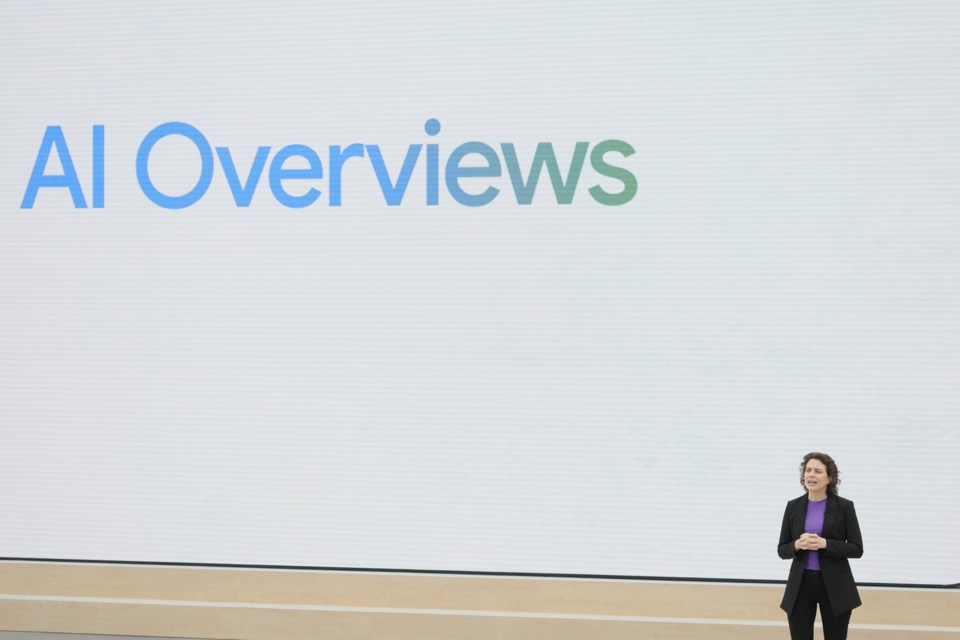Business
Canadian Publishers Sound Alarm Over Google AI Summaries Impact

Canadian news publishers are raising significant concerns over the impact of AI-generated summaries on Google search results. Many argue these summaries are adversely affecting online traffic to news outlets, while experts caution about the accuracy of the information being presented. The introduction of Google’s AI Overview feature last year has prompted a reevaluation of how news is consumed online.
Jessica Johnson, a senior fellow at McGill University’s Centre for Media, Technology and Democracy, expressed her apprehension regarding the technology’s accuracy. She noted, “It’s one of those very sweeping technological changes that has changed the way we… search, and therefore live our lives, without really much of a big public discussion.” Johnson’s concerns reflect a broader unease within the journalism community about the ramifications of AI on news dissemination.
While users have reported inaccuracies in AI summaries, there is currently no academic research defining the full extent of the problem. A report from the BBC earlier this year highlighted “significant inaccuracies” in the outputs of various AI chatbots, although it did not specifically analyze the Google AI Overview feature. In small print below its AI summaries, Google warns that “AI responses may include mistakes,” yet the company claims that the accuracy of these summaries is comparable to other search features, such as featured snippets.
A Google spokesperson stated, “As people use AI Overviews, we see they’re happier with their results, and they come to Google to even ask more of their questions.” Despite this assertion, experts like Chirag Shah, a professor at the University of Washington’s information school, explain that the error rate stems from the nature of generative AI, which relies on predictions from vast training data without verifying the accuracy of the information retrieved.
Shah pointed out that AI does not comprehend context in the same way humans do, stating, “What if those documents are flawed? What if some of them have wrong information, outdated information, satire, sarcasm?” This fundamental issue raises concerns about how users interact with AI-generated content.
As search engines increasingly integrate AI, there is a shift in how information is accessed online. Shah emphasized, “If that gets consolidated… that’s essentially the end of the free web.” This transformation, he noted, significantly alters the landscape of the internet, an issue that merits serious attention.
A study by the Pew Research Center revealed that users are less likely to click on links when presented with AI summaries. Traditional search results led to a 15 percent click-through rate, while AI summaries only achieved an eight percent rate. This trend is alarming for news publishers, including Paul Deegan, CEO of News Media Canada, who highlighted the financial implications. “Zero clicks is zero revenue for the publisher,” Deegan stated.
Historically, Google has served as a crucial source of traffic for news outlets. Alfred Hermida, a professor at the University of British Columbia’s journalism school, noted that AI summaries may satisfy casual news consumers, potentially leading to diminished engagement with original news content. “When you have most people who are casual news consumers… that AI summary may be enough,” he explained.
In response to these concerns, a coalition of independent publishers submitted a complaint to the U.K.’s Competition and Markets Authority, arguing that AI summaries are harming their businesses. Keldon Bester, executive director of the Canadian Anti-Monopoly Project, indicated that there may be legal grounds for competition issues under Canadian law. He pointed to Google’s history of facing antitrust lawsuits, including a significant case brought by the U.S. Department of Justice.
Bester remarked, “We have a single company which is and has been the front door to the internet.” The potential narrowing of access through AI summaries and chatbot interactions raises ongoing concerns regarding competition and diversity in information sources.
In a recent post, Liz Reid, Google’s head of search, asserted that organic click volume from searches to websites has remained “relatively stable year-over-year.” She dismissed claims of dramatic declines in traffic as misrepresented, attributing them to flawed methodologies.
Clifton van der Linden, an associate professor at McMaster University, acknowledged that while many AI summaries provide accurate information, the perception of usefulness does not necessarily align with credibility. He cautioned that bypassing news site links due to AI-generated content exacerbates existing challenges in Canadian media, particularly in light of recent legislative changes.
In 2023, the Canadian government enacted the Online News Act, mandating that platforms like Meta and Google compensate news publishers for their content. Following the legislation, Meta blocked news links on its platforms, while Google began making payments. The future of this legislation remains uncertain, with Prime Minister Mark Carney suggesting a willingness to reconsider its provisions.
Johnson highlighted the precarious situation facing Canadian media, describing it as a “one-two punch” from both Meta’s actions and the rise of AI search engines. She stated, “The point is, and other publishers have raised this, what’s the point of me producing this work if no one’s going to pay for it, and they might not even see it?”
As the discourse around AI in the media landscape continues, the implications for publishers and consumers alike will be critical to monitor.
-

 Politics4 weeks ago
Politics4 weeks agoSecwepemc First Nation Seeks Aboriginal Title Over Kamloops Area
-

 World5 months ago
World5 months agoScientists Unearth Ancient Antarctic Ice to Unlock Climate Secrets
-

 Entertainment5 months ago
Entertainment5 months agoTrump and McCormick to Announce $70 Billion Energy Investments
-

 Science5 months ago
Science5 months agoFour Astronauts Return to Earth After International Space Station Mission
-

 Lifestyle5 months ago
Lifestyle5 months agoTransLink Launches Food Truck Program to Boost Revenue in Vancouver
-

 Technology3 months ago
Technology3 months agoApple Notes Enhances Functionality with Markdown Support in macOS 26
-

 Lifestyle3 months ago
Lifestyle3 months agoManitoba’s Burger Champion Shines Again Amid Dining Innovations
-

 Top Stories2 months ago
Top Stories2 months agoUrgent Update: Fatal Crash on Highway 99 Claims Life of Pitt Meadows Man
-

 Politics4 months ago
Politics4 months agoUkrainian Tennis Star Elina Svitolina Faces Death Threats Online
-

 Sports5 months ago
Sports5 months agoSearch Underway for Missing Hunter Amid Hokkaido Bear Emergency
-

 Politics5 months ago
Politics5 months agoCarney Engages First Nations Leaders at Development Law Summit
-

 Technology5 months ago
Technology5 months agoFrosthaven Launches Early Access on July 31, 2025





















